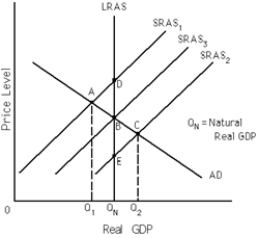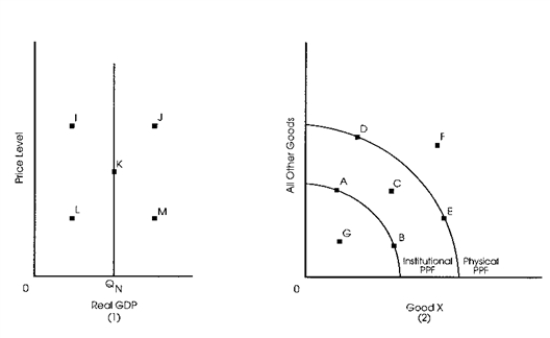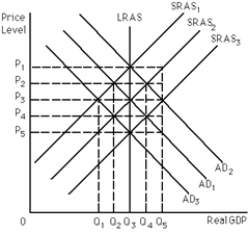A) spending equals saving.
B) saving equals income.
C) income equals wealth.
D) none of the above
Correct Answer

verified
Correct Answer
verified
Multiple Choice
Exhibit 9-3
 -Refer to Exhibit 9-3. The economy is in short-run equilibrium and has an inflationary gap at point
-Refer to Exhibit 9-3. The economy is in short-run equilibrium and has an inflationary gap at point
A) A.
B) B.
C) C.
D) D.
E) E.
Correct Answer

verified
Correct Answer
verified
Multiple Choice
If the economy is currently operating below its institutional production possibilities frontier (institutional PPF) , it is
A) in long-run equilibrium.
B) in a recessionary gap.
C) in an inflationary gap.
D) definitely not self-regulating.
E) b and d
Correct Answer

verified
Correct Answer
verified
True/False
It is possible for the economy to be producing at a point that lies beyond its institutional production possibilities frontier (PPF), but not its physical PPF.
Correct Answer

verified
Correct Answer
verified
Multiple Choice
Suppose the economy's short-run equilibrium level is at a point to the left of Natural Real GDP. Which of the following statements is true?
A) The economy is in an inflationary gap.
B) The economy is in a recessionary gap.
C) The economy is in long-run equilibrium.
D) This situation is actually impossible.
Correct Answer

verified
Correct Answer
verified
Multiple Choice
A recessionary gap exists if (actual) Real GDP is __________ Natural Real GDP.
A) less than
B) greater than
C) equal to
D) b and c
E) none of the above
Correct Answer

verified
Correct Answer
verified
Multiple Choice
If the economy is self-regulating and in an inflationary gap,
A) wages and prices will fall.
B) wages will rise, but prices will fall.
C) wages and prices will rise.
D) wages will fall, but prices will rise.
E) neither wages nor prices will change.
Correct Answer

verified
Correct Answer
verified
Multiple Choice
The classical economists felt that saving would be equal to investment because
A) wages are flexible.
B) prices of domestic goods are flexible.
C) interest rates are flexible.
D) prices of imports are flexible.
Correct Answer

verified
Correct Answer
verified
Multiple Choice
When there is an inflationary gap, (actual) Real GDP is __________ Natural Real GDP, and the (actual) unemployment rate is __________ the natural unemployment rate.
A) greater than; less than
B) greater than; greater than
C) less than; greater than
D) less than; less than
E) less than; equal to
Correct Answer

verified
Correct Answer
verified
Multiple Choice
If the natural unemployment rate is 5.5 percent, then the economy is in a recessionary gap when the actual unemployment rate is
A) greater than 5.5 percent.
B) between 0 and 5.5 percent.
C) 0 percent.
D) 5.5 percent.
Correct Answer

verified
Correct Answer
verified
Multiple Choice
When the current state of the economy is such that Real GDP is greater than Natural Real GDP, the economy is in a(n) ____________________ gap. In this situation, the (actual) unemployment rate is ___________ than the natural unemployment rate, and there is a ________________ in the labor market.
A) recessionary; greater; shortage
B) inflationary; less; shortage
C) inflationary; greater; surplus
D) recessionary; greater; surplus
E) recessionary; less; shortage
Correct Answer

verified
Correct Answer
verified
Multiple Choice
The economy can operate
A) beyond its institutional PPF but not beyond its physical PPF.
B) on both its institutional PPF and its physical PPF, but not at the same time.
C) under its physical PPF but not under its institutional PPF.
D) a and b
E) a, b, and c
Correct Answer

verified
Correct Answer
verified
Multiple Choice
If the economy is currently in a recessionary gap,
A) all economists will agree that the economy can remove itself from the recessionary gap without government intervention.
B) some economists will argue that the economy can remove itself from the recessionary gap without government intervention.
C) no economist will state that the economy can remove itself from the recessionary gap without government intervention.
D) all economists will agree that over time the recessionary gap will worsen.
Correct Answer

verified
Correct Answer
verified
Multiple Choice
An inflationary gap exists when AD and SRAS
A) fail to intersect.
B) intersect to the right of Natural Real GDP.
C) intersect to the left of Natural Real GDP.
D) both have a positive slope.
Correct Answer

verified
Correct Answer
verified
Multiple Choice
Exhibit 9-5
 -Refer to Exhibit 9-5. Imagine an AD curve and an SRAS curve intersecting at Point I on graph (1) . Which point(s) would this correspond to on graph (2) ?
-Refer to Exhibit 9-5. Imagine an AD curve and an SRAS curve intersecting at Point I on graph (1) . Which point(s) would this correspond to on graph (2) ?
A) A or B
B) C
C) D or E
D) F
E) G
Correct Answer

verified
Correct Answer
verified
Multiple Choice
When the economy is in an inflationary gap, the labor market is experiencing a _____________. In a self-regulating economy, wage rates will then ___________ and the ______________ curve will shift __________________.
A) shortage; rise; SRAS; leftward
B) shortage; fall; SRAS; leftward
C) surplus; rise; AD; rightward
D) shortage; fall; AD; rightward
E) surplus; fall; SRAS; rightward
Correct Answer

verified
Correct Answer
verified
Multiple Choice
When consumers start to spend less and save more, classical macroeconomists believe that interest rates will then ______________ resulting in a(n) ________________ in investment.
A) rise; increase
B) fall; increase
C) fall; decrease
D) rise; decrease
Correct Answer

verified
Correct Answer
verified
Multiple Choice
Exhibit 9-4
 -Refer to Exhibit 9-4. Assume the economy is self-regulating and currently is in long-run equilibrium with the price level equal to P3. After an initial increase in U.S. exports, the economy will move to long-run equilibrium by a shift from
-Refer to Exhibit 9-4. Assume the economy is self-regulating and currently is in long-run equilibrium with the price level equal to P3. After an initial increase in U.S. exports, the economy will move to long-run equilibrium by a shift from
A) AD3 to AD1.
B) SRAS1 to SRAS2.
C) SRAS2 to SRAS1.
D) AD3 to AD2.
E) none of the above
Correct Answer

verified
Correct Answer
verified
Multiple Choice
The classical economists argued that saving is matched by an equal amount of investment because of
A) wage flexibility.
B) price flexibility.
C) money flexibility.
D) interest rate flexibility.
E) b and c
Correct Answer

verified
Correct Answer
verified
Multiple Choice
Exhibit 9-8 Suppose that at a given price level the following values exist in a hypothetical economy: Consumption = $7,000 billion Investment = $1,900 billion Government Purchases = $1,700 billion Exports = $300 billion Imports = $300 billion Assume that the level of total expenditures is equal to the value of goods and services that suppliers want to sell. -Refer to Exhibit 9-8. If saving increases by $500 billion, the new level of consumption will equal ______________. According to classical economists investment would _______________ and total expenditures would ________________________.
A) $6,500 billion; then decrease by $500 billion; fall by $500 billion
B) $6,500 billion; then increase by $500 billion; fall by $500 billion
C) $7,500 billion; remain constant; fall by $500 billion
D) $6,500 billion; then increase by $500 billion; remain constant
Correct Answer

verified
Correct Answer
verified
Showing 41 - 60 of 172
Related Exams